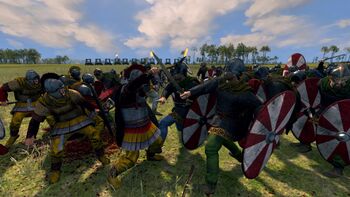Slavic-Symmerian Wars
| Slavic-Symmerian Wars | |||||||
|---|---|---|---|---|---|---|---|
 Slavic warriors and Symmerian soldiers clash in battle | |||||||
| |||||||
| Belligerents | |||||||
|
Slavic League
|
House of Baligov (970-onward) | ||||||
| Commanders and leaders | |||||||
|
Bogumir Dragoslav the Bold Georgei I Liudevit Kazimir the Mad Stanislav Tikhomir Samo the Brave Voitsekh Tomila the Wild |
Aristoxenus Kallixeina the Reclaimer Aischylos Hyperides Miltiades Geminos Diagoras Sthenelaus Orestes VI Pratinas Branaxa Syennesis Tuchaeus Kallikrates Evios Lykidas Eudokimos Koralia Paraskeve Soterious Zethos IV Gregorius Sophronios Elpidios | ||||||
| Casualties and losses | |||||||
| Heavy | Heavy | ||||||
The Slavic-Symmerian Wars were a series of conflicts fought between the Slavic tribes and Kingdoms of Eracura against the Symmerian Empire between the 9th and 15th Centuries. Contact between Slavic tribes and the Symmerians had existed since early antiquity, but through the conduit of the Acrean Empire. Conflict between the various Slavic tribes and nations began shortly after their breakaway from Acrean dominion in the aftermath of the Burning Plague, which gradually escalated from small scale local raids across the Sundering Sea to large scale warfare during the Crisis of the Ninth Century. In 919 the Kingdom of Dragovita led by Dragoslav the Bold and in alliance with other Slavic tribes in what was known as the Slavic league invaded Chryse and Syara, temporarily deposing the Zelusian Dynasty from their homeland and beginning the Slavokratia. Slavic rule over Syaran resulted in the beginning of Slavicization which gradually brought the era of Hellenic Syara to and end. Slavic holdings in Siduri gradually receded due to infighting and failed expansion efforts. Under Kallixeina the Reclaimer the Symmerians reconquered Syara, aided by the defection of the House of Baligov to the Symmerian side in exchange for their continued rule over Galania.
By the 11th Century Slavic holdings in Siduri had been eliminated, though sporadic raids and counter-raids continued for centuries. The Symmerians launched several campaigns against the Slavic nations of Eracura between the 11th and 13th centuries with the intent to reincorporate Eracuran holdings into the Empire but were never successful at restoring long term dominion over former Syaran domains outside of Chryse. Symmerian efforts were routinely halted by the collapse of their empire in eastern Siduri; nevertheless Symmerian attacks and invasions wreaked havoc on the economic and political stability of the Slavic nations which contributed to the demise of larger political entities including the Slavic League. Occasional raiding and pillaging continued into the 14th Century, with the conflict continuing past the fall of the Symmerians to the Adamdar Empire in 1305. Modern historians typically utilize the dissolution of the Symmerian Khanate and the establishment of the Rioni Union to mark the end of the wars, though fighting continued regardless and culminated in the First Chryse War.
Many of the conflicts of the Slavic-Symmerian Wars were inconclusive or did not involve easily defined beginning and end points. Nevertheless, the impact of the conflicts were immense. Slavokratia and its ramifications resulted in the development of a unique Hellenic-Slavic culture in Syara which eventually brought about the modern Syaran language and the extinction of the Symmerian language. The migration of Slavic tribes involved in the conflict resulted in the formation of what would eventually become modern Górska. Concurrently, the arrival of Slavs in south-west Eracura effectively brought an end to the Bosrei as a distinct people and culture, while the spread of early Górskan settles in Chryse set the stage for multiple conflicts between Górska and later Syaran states. The Slavic League would become a historical rally cry for pan-Slavic sentiment, continuing into the modern era.